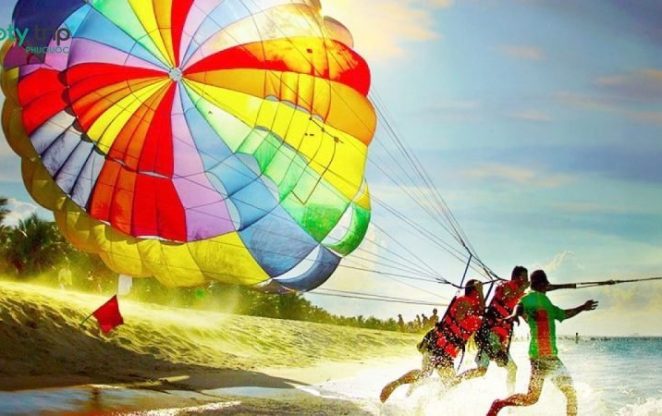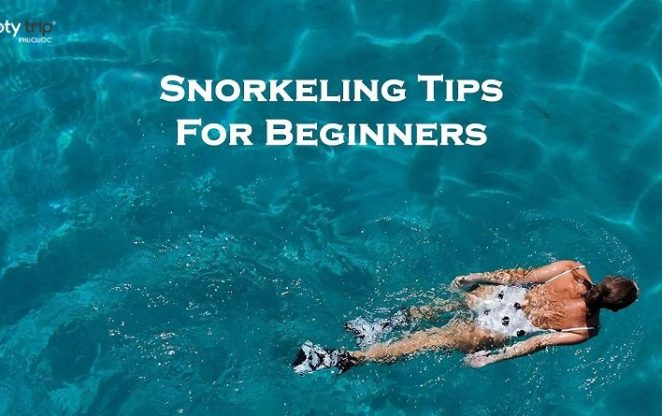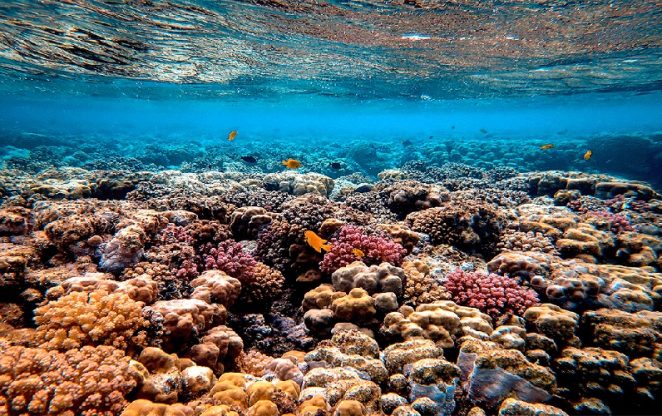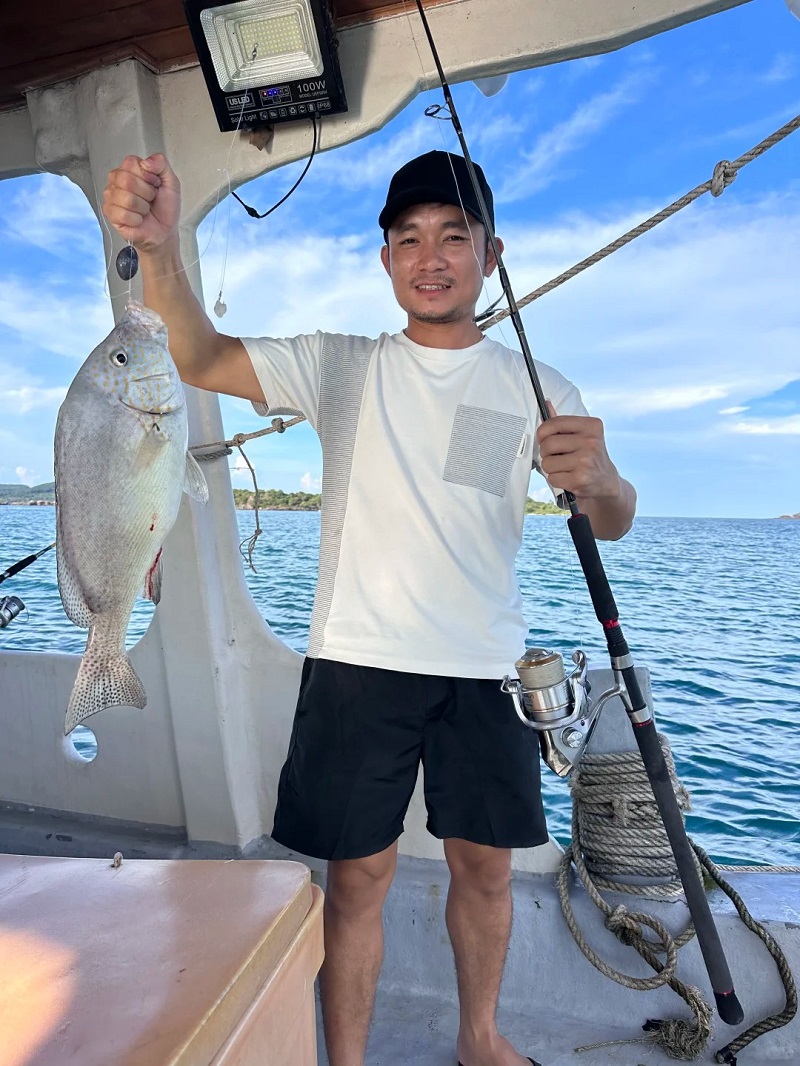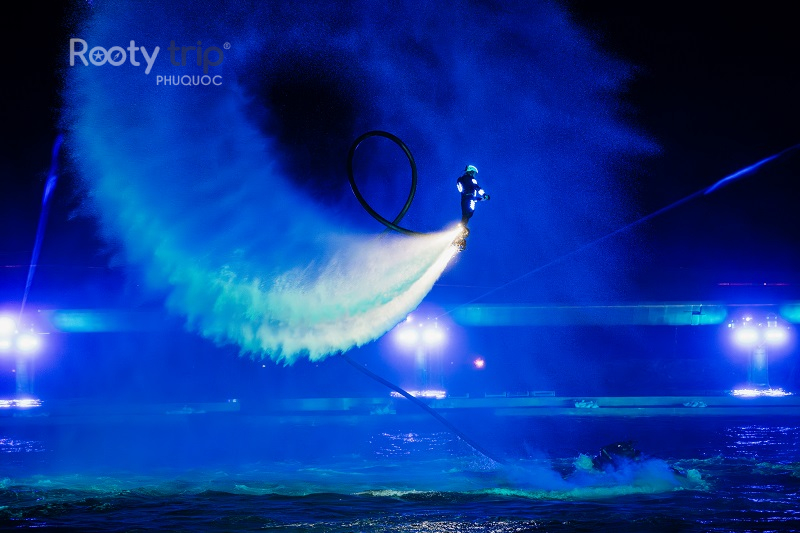Scuba Diving in Phu Quoc – Best Spots, Tips & What to Expect
Snorkeling - Fishing
Scuba diving is something special that you must experience once in your life. This is an underwater activity that gives you the opportunity to explore the colorful and mysterious ocean world. Whether you are a beginner or a professional diver, scuba diving always brings memorable moments, stimulating curiosity to explore and love the beauty of the undersea world. So do you want to experience it once? Let’s find out details with Rooty Trip!
What is Scuba Diving?
Introduction to the concept of scuba diving
- Scuba diving is a form of intensive diving in which divers use a tank of compressed air (usually a mixture of oxygen and nitrogen) to breathe while moving underwater. This technique allows divers to access and explore the ocean at greater depths and for longer periods of time than other diving methods, creating an intimate experience with the marine ecosystem. Scuba diving is not only a sport but also a way to explore the beauty of the ocean and its rich marine life.
Differences between scuba diving and other types of diving (snorkeling)
- The biggest difference between scuba diving and snorkeling lies in the depth and duration of the dive. Snorkeling only allows participants to float on the surface or dive shallowly while breathing through an air tube connected to the water’s surface, limiting the depth and time of exploration. In contrast, scuba diving helps divers move freely underwater thanks to compressed air tanks providing oxygen, allowing divers to go deeper into the sea and spend more time exploring.
Necessary Equipment for Scuba Diving
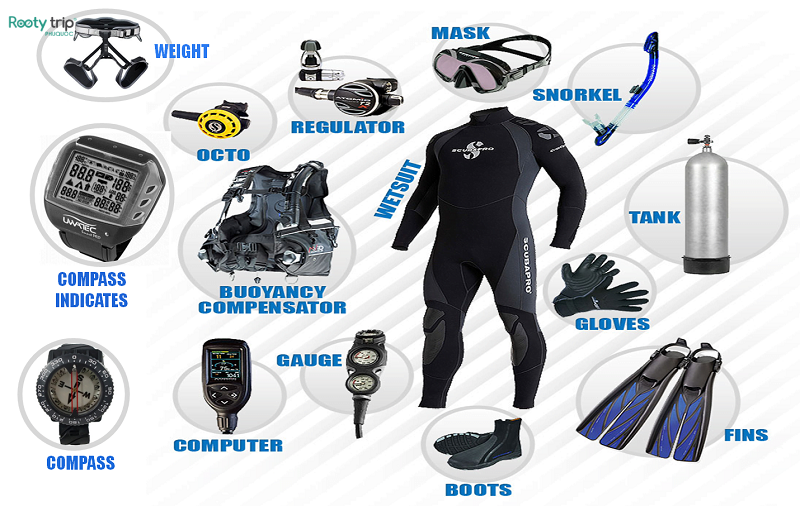
Necessary Equipment for Scuba Diving
There is some necessary equipment for scuba diving as follows:
Scuba Diving Mask
Scuba diving masks help maintain clear underwater vision and protect eyes and nose. When choosing a scuba diving mask, make sure the mask fits your face properly to prevent water leakage. Additionally, high-quality scuba diving masks also help divers have a wide field of vision, minimize fogging, and provide a pleasant diving experience.
Oxygen Tank
Oxygen tanks are essential equipment for scuba diving, providing oxygen for scuba diving participants. There are many different sizes and types of tanks, depending on the duration and depth of the dive. Larger tanks can hold more compressed air, helping to prolong diving time, but they are heavier. Air tank pressure also needs to be checked carefully to ensure the appropriate amount of air for the entire dive.
Regulator
The regulator is a device connected to an oxygen tank, which helps convert high-pressure air into a breathable air flow when inhaled. Regulators must be regularly maintained to ensure proper operation. For beginners, learning how to use the regulator properly is an important step in protecting yourself from diving mishaps.
Diving Suit and Fins
The diving suit helps keep the diver warm and protects the skin from dangerous underwater agents, while the fins help the diver move more easily without spending too much effort. Choosing the right suit for the water temperature and the right size fins will create optimal comfort during your scuba diving session.
BCD (Buoyancy Control Device)
The BCD is a buoyancy adjustment device that helps divers maintain balance underwater and maintain the desired depth. Divers can add or reduce the amount of air in the BCD to change buoyancy, easily float to the surface or dive as desired.
Scuba Diving procedures for beginners
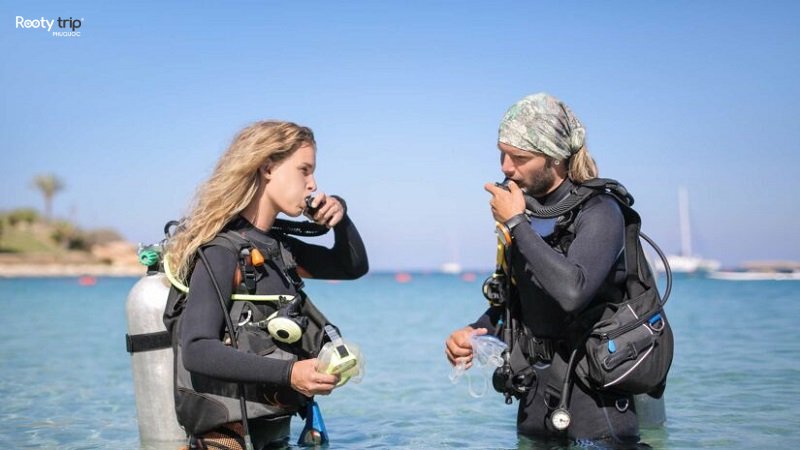
Scuba Diving procedures for beginners
Refer to the process carefully to understand how to scuba dive properly and safely.
Preparation steps before diving
Before starting scuba diving, you need to check all equipment to ensure safety. Make sure the mask, regulator, oxygen tank and BCD are all working properly. In addition, divers need to warm up gently to relax muscles and reduce stress.
Basic diving techniques
When scuba diving, underwater breathing techniques and buoyancy control are two important factors. Slow, even breathing helps conserve oxygen and maintain a calm state of mind. BCD buoyancy control helps avoid collisions with the seabed or coral reefs. Follow diving techniques strictly to ensure safety.
How to handle situations when encountering problems
Even if you follow proper diving techniques, during scuba diving, divers may encounter unwanted situations such as shortness of breath, equipment malfunction, or even panic. When encountering an incident, it is important to stay calm and practice the basic handling techniques you have learned, such as sharing air sources with diving partners or using backup equipment.
Listening to scuba diving instructions and reading experiences for beginners are extremely important for your diving experience.
Basic techniques when Scuba Diving
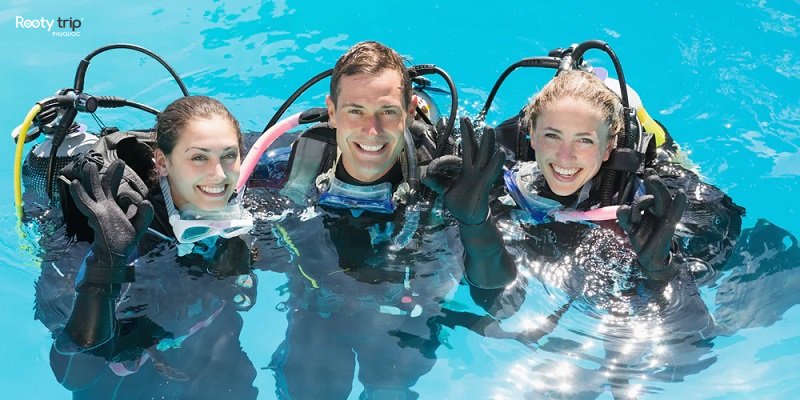
Basic techniques when Scuba Diving
Correct breathing technique
The most important thing about scuba diving technique is breathing. The correct underwater breathing technique is to breathe slowly and evenly, helping the body absorb oxygen effectively and maintain calm. Avoid breathing too fast or holding your breath for too long because it can cause tension and lack of oxygen.
How to control pressure in the ear
When diving deep, the pressure increases, making the ears susceptible to pain or damage. Techniques to equalize pressure in the ear, such as holding your breath slightly, yawning, or blowing gently while holding your nose, help reduce the risk of ear injury.
Buoyancy adjustment skill
Buoyancy adjustment is an important skill for maintaining the desired depth when scuba diving. Using a BCD and controlling your breathing helps divers maintain balance underwater, move easily and avoid collisions with the seabed or coral.
In general, scuba diving techniques are not too difficult, but they require concentration and thorough preparation from the diver in advance. This will ensure your safety and provide a perfect diving experience.
The most beautiful scuba diving places in Vietnam
Some popular scuba diving locations in Vietnam include:
Phu Quoc
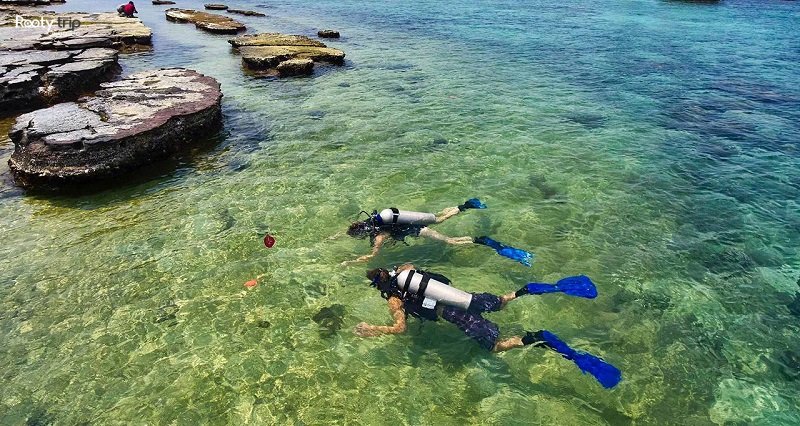
Phu Quoc
Phu Quoc is the most famous scuba diving destination in Vietnam, known as a scuba diving paradise with clear blue waters and a diverse marine ecosystem. Scuba diving in Phu Quoc often takes place at popular dive spots such as Hon Thom Island, May Rut Island, Hon Buom Island, Doi Moi Island, Kim Quy Island, etc., all of which are ideal for exploring coral reefs and rich marine life.
Nha Trang
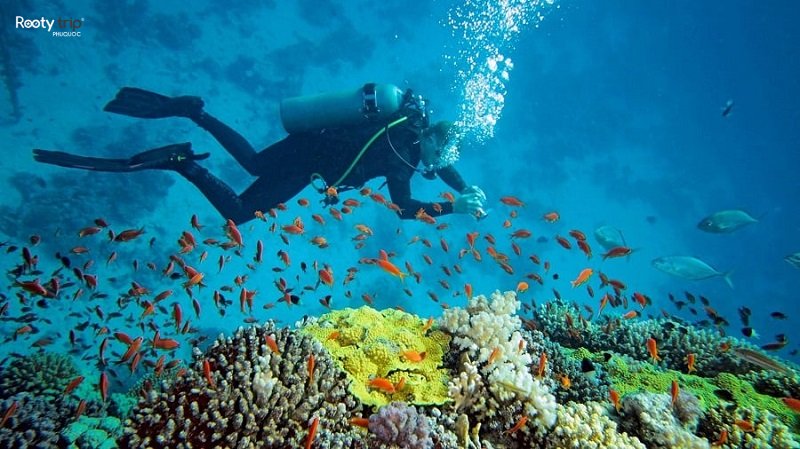
Nha Trang
Besides Phu Quoc, Nha Trang is also one of the beautiful scuba diving locations in Vietnam, with many spots like Hon Mun, which boasts colorful coral reefs and diverse marine life. Diving services here are very diverse, suitable for both beginners and professional divers.
Da Nang
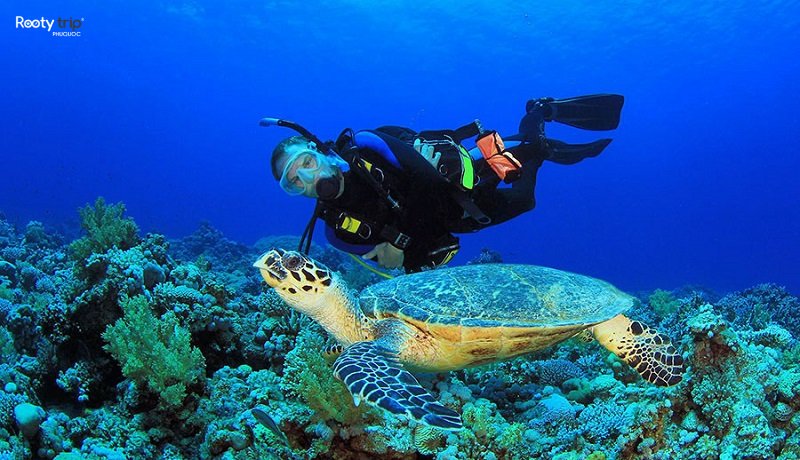
Da Nang
Da Nang has a beautiful coastline and clear blue sea, especially in the Son Tra Peninsula area. The coral reefs here are very rich, suitable for both recreational and professional divers.
Con Dao
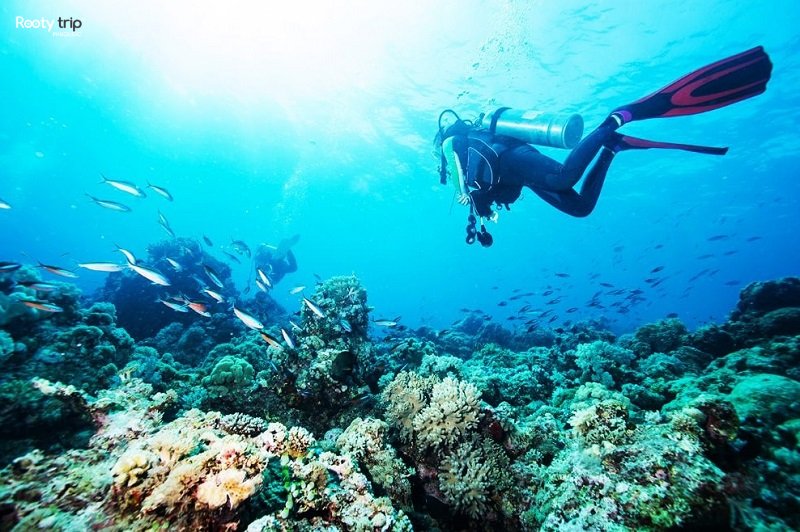
Con Dao
Con Dao is an ideal diving destination with pristine landscapes, diverse coral reefs, and rich marine ecosystem. The coral reefs in Con Dao are rarely exploited, providing an experience that is close to nature.
Important notes when scuba diving
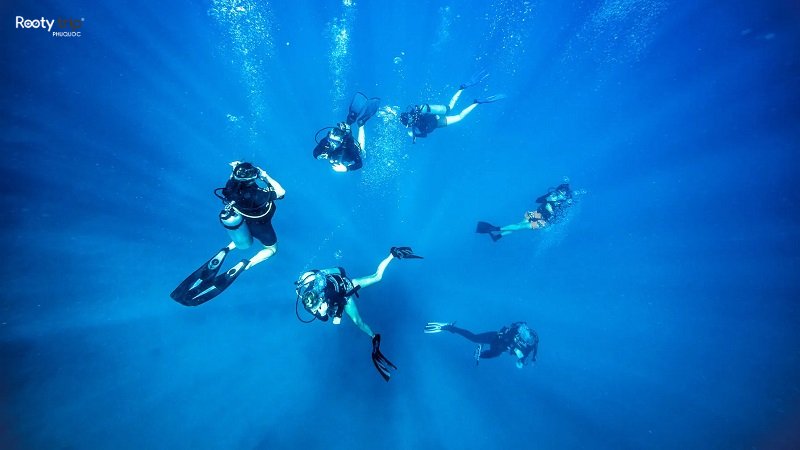
Important notes when scuba diving
Equipment maintenance
Necessary equipment for scuba diving needs to be checked and maintained periodically to avoid unwanted problems. In addition to maintaining diving equipment, parts such as regulators and oxygen tanks also need to be thoroughly cleaned after each use to ensure they are always in good condition.
Check your health before diving
Health is an important factor when participating in scuba diving. Divers should check their general health, especially the heart and lungs, and avoid diving when tired or stressed.
In addition to health, carefully learning about scuba diving experiences for beginners is also extremely important to gain more practical knowledge about the scuba diving experience.
Things to avoid when scuba diving
Do not scuba dive alone, especially if you are inexperienced. Avoid diving too deep if you do not have sufficient skills and equipment. It is essential to follow safety rules and the instructor’s instructions.
Whether you are a beginner or have a lot of experience, scuba diving always leaves unforgettable impressions and a deep sense of connection with the natural world. Equip yourself with knowledge, skills, and an adventurous spirit to get ready to explore an amazing world that awaits beneath the deep blue water!
Frequently Asked Questions (FAQ)
What do I need to prepare before taking a scuba diving course?
- You need to check your health, prepare for comfort, and gather necessary items such as swimsuits and towels.
What skills do you need to learn when scuba diving?
- Important skills include proper breathing, buoyancy control, troubleshooting, and ear pressure equalization techniques.
Is scuba diving safe?
- Scuba diving is safe if you follow scuba diving rules and instructions, master the necessary skills and how to use equipment and handle situations.
Which diving locations are suitable for beginners?
- Phu Quoc is a popular scuba diving destination in Vietnam, ideal for beginners, with clear blue water environment and professional instructors.
ROOTY TRIP PHU QUOC
- Address: 191 Tran Hung Dao Street, Cua Lap Ward, Phu Quoc Special Zone, An Giang Province, Viet Nam
- Phone/Whatsapp: 0886.068.886 – 033.906.2222
- Email: cskh@rootytrip.com
- Fanpage: https://www.facebook.com/rootytripphuquoc/
- Instagram: https://www.instagram.com/rootytrip/
Comment
Leave comments & reviews
Login to comment & rate







